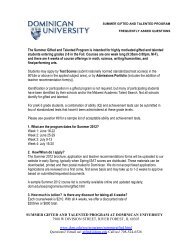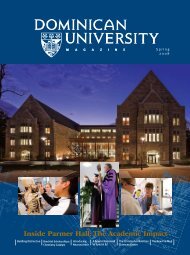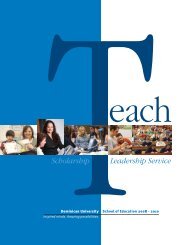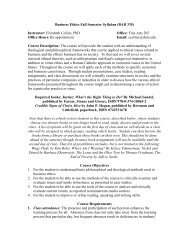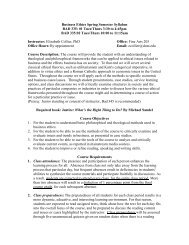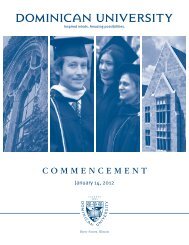6 2 - Dominican University
6 2 - Dominican University
6 2 - Dominican University
Create successful ePaper yourself
Turn your PDF publications into a flip-book with our unique Google optimized e-Paper software.
Concepts in Successful Aging<br />
As a child, Adrian Kok learned a lot about how to live a successful and fulfilling life from his<br />
grandmother. While his parents were working, his grandmother watched him and taught him<br />
many life lessons, which he hasn’t forgotten to this day.<br />
“I am inspired by her zest for life, her generosity, her forgiving<br />
nature, her optimism, and her belief that there is always a solution to<br />
every problem,” Kok says. “These are qualities that I have found to<br />
be important in order to be successful. She showed me that life could<br />
be lived fully with very few material things and, more importantly,<br />
she showed me what successful aging meant.”<br />
Kok, associate professor in the Graduate School of Social Work, is<br />
now instilling some of these lessons in social work students who plan<br />
to serve the aging population. Kok leads <strong>Dominican</strong>’s new gerontology<br />
certificate program, which is funded through a grant from the Council<br />
on Social Work Education’s National Center for Gerontological<br />
Social Work Education. In order to receive the certificate, students<br />
in the master’s of social work program take foundational courses that<br />
have an emphasis in gerontology in addition to interning at several<br />
aging agencies.<br />
Mark Rodgers, PhD, dean, Graduate School of Social Work, explains<br />
that students in the gerontology certificate program are well trained<br />
to work with this ever-growing population. “The Baby Boomer<br />
generation is retiring and the social work profession is not prepared<br />
to meet the needs of the elderly. By 2015, it is estimated that 70,000<br />
trained gerontology social workers are going to be necessary,” Rodgers<br />
explains. “The certificate program positions our students to not only<br />
have an MSW degree but also have this designated certificate. It will<br />
give them a leg up since they will have already completed internships<br />
in the field of gerontology.”<br />
As the Baby Boomer generation ages, Kok is hopeful that more<br />
gerontology related jobs will be created and that the salary for these<br />
jobs will increase. “Baby Boomers are going to demand more<br />
independence and better care as they age,” he says.<br />
While the opportunities are great, one of the biggest challenges is<br />
getting students interested in gerontology. “While students love to<br />
work with families and children, we have grants to provide stipends<br />
to students working in agencies for the aging. So, there is an<br />
incentive to try it out and gain important experience.”<br />
RESEARCH SPOTLIGHT<br />
FEATURE<br />
Students in the certificate program work at several different types<br />
of agencies such as nursing homes, retirement communities, hospice<br />
facilities, hospitals and government agencies, so that they can get<br />
experience in a wide range of options. In the classroom, the students<br />
take the required 20 social work courses, however 10 of the<br />
foundation courses are infused with gerontology. In addition,<br />
students who already have their MSW can complete a four-course<br />
program to receive a certificate in aging.<br />
Because of Kok’s research and experience, <strong>Dominican</strong>’s certificate<br />
program has an emphasis on ways to use technology with older<br />
adults. In addition, there is a great deal of advocacy work that social<br />
workers can do on behalf of the elderly. Issues such as working rights,<br />
ageism, community involvement and public policy are all ways for<br />
gerontology-trained social workers to be involved.<br />
“There is a great need to train social workers to pay attention to the<br />
needs of older adults. We strive to help students understand these<br />
needs from the micro level, or one-to-one relationships, to the macro<br />
level, such as political advocacy issues,” Kok says.<br />
For his accomplishments in the classroom and his work in the<br />
gerontology program, Kok was recently honored with the Graduate<br />
School of Social Work’s Excellence in Teaching Award.<br />
“His students always find him to be a very organized teacher and a<br />
professor who is enthusiastic about the sometimes difficult subject of<br />
social work research,” Rodgers says. “He uses a lot of creativity in the<br />
classroom, and his classes are very interactive and interesting. He is<br />
effective at conveying the practical applications of what the students<br />
are learning.”<br />
With gerontology, Kok has found that when students have personal<br />
experiences with older adults in their lives, they are more able to<br />
understand the curriculum. In accepting his recent award, Kok<br />
encouraged students to ignore the cell phones and computers and<br />
spend more time talking with their elders. “Your relationships with<br />
older adults give you an important perspective – they humanize your<br />
own aging and deepen your empathy. And, you just might be able<br />
to see the greater good in the things that you do.”<br />
Fall 2010 <strong>Dominican</strong> <strong>University</strong> Magazine<br />
21 17



